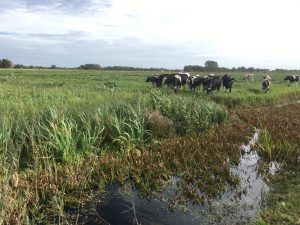Eutrophication turns aquatic omnivores into vegetarians
by Jef Huisman, University of Amsterdam
1/21/2021
The feeding behaviour of several invertebrate animals in aquatic food webs is drastically changed by increasing inputs of nitrogen and phosphorus into surface waters. This is demonstrated in a new study by researchers from the University of Amsterdam and Wageningen Environmental Research, that is now published in the scientific journal Ecology. The researchers show that several invertebrate animals shift their diet from animal to plant material as the nutritional quality of algae and water plants increases.

The investigated ditch adjacent to agricultural fields. Courtesy of Ralf Verdonschot & The University of Amsterdam.
The nutrient crisis
Human activity, in particular intensified agriculture, has dramatically increased the inputs of nitrogen and phosphorus into surface waters. Nutrient inputs are especially high in the Netherlands with its intensive land use, as illustrated by new environmental policies related to the Dutch ‘nitrogen crisis’ (in Dutch known as the ‘stikstofcrisis’). In many aquatic ecosystems, high nutrient loads result in excessive growth of plants and algae including harmful algal blooms, often accompanied by major biodiversity losses.
Another well-known effect of nutrient enrichment is that it enhances the nitrogen and phosphorus content in the tissues of water plants and algae, which often increases their nutritional quality as food for potential herbivores. This may affect the structure and functioning of aquatic food webs, but how exactly is not yet fully understood
Read more here: https://ibed.uva.nl/content/news/2021/01/eutrophication-turns-aquatic-omnivores-into-vegetarians.html?origin=b2QFvrBwSRGQTONw78zjxw&cb&cb
Read the Ecology paper: https://esajournals.onlinelibrary.wiley.com/doi/abs/10.1002/ecy.3275